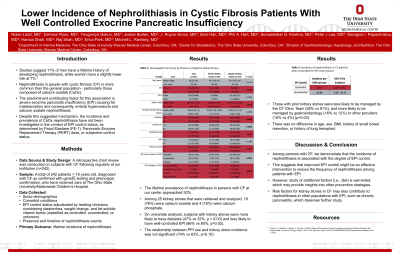Sunday Poster Session
Category: Biliary/Pancreas
P0057 - Lower Incidence of Nephrolithiasis in Cystic Fibrosis Patients With Well Controlled Exocrine Pancreatic Insufficiency
Sunday, October 27, 2024
3:30 PM - 7:00 PM ET
Location: Exhibit Hall E

Has Audio

Nolan P. Ladd, MD
The Ohio State University Wexner Medical Center
Columbus, OH
Presenting Author(s)
Da Yeon Ryoo, MD1, Nolan P. Ladd, MD1, Yevgeniya Gokun, MS2, Jordan Burlen, MD3, Phil Hart, MD1, Georgios Papachristou, MD, PhD1, Gretchen Murray, RD1, Kristen Roberts, PhD, RD1, Raj Shah, MD1, Ganesh Shidham, MD1, Erica Park, MD1, Mitchell L. Ramsey, MD1
1The Ohio State University Wexner Medical Center, Columbus, OH; 2Center for Biostatistics, The Ohio State University Wexner Medical Center, Columbus, OH; 3The Ohio State Wexner Medical Center, Powell, OH
Introduction: Kidney stones are more common in cystic fibrosis (CF) patients than in the general population. The predominant contributing factor is severe exocrine pancreatic insufficiency (EPI) causing enteral hyperoxaluria and calcium oxalate nephrolithiasis. However, the relationship between nephrolithiasis and degree of EPI control has not been assessed.
Methods: A retrospective cohort study was conducted on subjects with CF at our institution (n=242). Data included socio-demographics, EPI control status adjudicated by treating clinicians considering steatorrhea, weight change, and fat-soluble vitamin levels (classified as controlled, uncontrolled, or unknown), and presence and timeline of nephrolithiasis events, among others. The primary outcome was the lifetime incidence of nephrolithiasis.
Results: The lifetime prevalence of any nephrolithiasis event in our study population was 30%. When dichotomized according to controlled (n=167) vs uncontrolled EPI (n=26), the incidence of kidney stones was 2.14 (95% confidence interval [CI] 1.29-3.57) and 10.89 (95% CI 4.78-24.73) per 1,000 person-years, respectively (p = 0.003). Among 25 kidney stones that were retrieved and analyzed, most (76%) were calcium oxalate. Among 64 subjects with nephrolithiasis, 34 (53%) experienced recurrent nephrolithiasis during follow-up with a median of 2 episodes (range 1-18).
On univariate analysis, subjects with kidney stones were more likely to have diabetes (47% vs 32%, p = 0.03) and less likely to have well-controlled EPI (66% vs 80%, p=0.02). There was a significant difference in the specialty of clinicians who managed EPI for subjects with and without kidney stones. Those with prior stones were less likely to be managed by the CF Clinic Team (65% vs 81%), and more likely to be managed by gastroenterology (16% vs 12%) or other providers (15% vs 4%, overall p=0.03). There was no difference in age, sex, BMI, PPI use, history of small bowel resection, or history of lung transplant between those with and without kidney stones.
Discussion: Among persons with CF, the incidence of nephrolithiasis is significantly associated with the degree of EPI control. This suggests that improved EPI control is an important intervention to reduce the frequency of nephrolithiasis in CF. Investigation into other potential contributing factors (e.g., diet) is also warranted.
Note: The table for this abstract can be viewed in the ePoster Gallery section of the ACG 2024 ePoster Site or in The American Journal of Gastroenterology's abstract supplement issue, both of which will be available starting October 27, 2024.
Disclosures:
Da Yeon Ryoo, MD1, Nolan P. Ladd, MD1, Yevgeniya Gokun, MS2, Jordan Burlen, MD3, Phil Hart, MD1, Georgios Papachristou, MD, PhD1, Gretchen Murray, RD1, Kristen Roberts, PhD, RD1, Raj Shah, MD1, Ganesh Shidham, MD1, Erica Park, MD1, Mitchell L. Ramsey, MD1. P0057 - Lower Incidence of Nephrolithiasis in Cystic Fibrosis Patients With Well Controlled Exocrine Pancreatic Insufficiency, ACG 2024 Annual Scientific Meeting Abstracts. Philadelphia, PA: American College of Gastroenterology.
1The Ohio State University Wexner Medical Center, Columbus, OH; 2Center for Biostatistics, The Ohio State University Wexner Medical Center, Columbus, OH; 3The Ohio State Wexner Medical Center, Powell, OH
Introduction: Kidney stones are more common in cystic fibrosis (CF) patients than in the general population. The predominant contributing factor is severe exocrine pancreatic insufficiency (EPI) causing enteral hyperoxaluria and calcium oxalate nephrolithiasis. However, the relationship between nephrolithiasis and degree of EPI control has not been assessed.
Methods: A retrospective cohort study was conducted on subjects with CF at our institution (n=242). Data included socio-demographics, EPI control status adjudicated by treating clinicians considering steatorrhea, weight change, and fat-soluble vitamin levels (classified as controlled, uncontrolled, or unknown), and presence and timeline of nephrolithiasis events, among others. The primary outcome was the lifetime incidence of nephrolithiasis.
Results: The lifetime prevalence of any nephrolithiasis event in our study population was 30%. When dichotomized according to controlled (n=167) vs uncontrolled EPI (n=26), the incidence of kidney stones was 2.14 (95% confidence interval [CI] 1.29-3.57) and 10.89 (95% CI 4.78-24.73) per 1,000 person-years, respectively (p = 0.003). Among 25 kidney stones that were retrieved and analyzed, most (76%) were calcium oxalate. Among 64 subjects with nephrolithiasis, 34 (53%) experienced recurrent nephrolithiasis during follow-up with a median of 2 episodes (range 1-18).
On univariate analysis, subjects with kidney stones were more likely to have diabetes (47% vs 32%, p = 0.03) and less likely to have well-controlled EPI (66% vs 80%, p=0.02). There was a significant difference in the specialty of clinicians who managed EPI for subjects with and without kidney stones. Those with prior stones were less likely to be managed by the CF Clinic Team (65% vs 81%), and more likely to be managed by gastroenterology (16% vs 12%) or other providers (15% vs 4%, overall p=0.03). There was no difference in age, sex, BMI, PPI use, history of small bowel resection, or history of lung transplant between those with and without kidney stones.
Discussion: Among persons with CF, the incidence of nephrolithiasis is significantly associated with the degree of EPI control. This suggests that improved EPI control is an important intervention to reduce the frequency of nephrolithiasis in CF. Investigation into other potential contributing factors (e.g., diet) is also warranted.
Note: The table for this abstract can be viewed in the ePoster Gallery section of the ACG 2024 ePoster Site or in The American Journal of Gastroenterology's abstract supplement issue, both of which will be available starting October 27, 2024.
Disclosures:
Da Yeon Ryoo indicated no relevant financial relationships.
Nolan Ladd indicated no relevant financial relationships.
Yevgeniya Gokun indicated no relevant financial relationships.
Jordan Burlen indicated no relevant financial relationships.
Phil Hart indicated no relevant financial relationships.
Georgios Papachristou indicated no relevant financial relationships.
Gretchen Murray indicated no relevant financial relationships.
Kristen Roberts indicated no relevant financial relationships.
Raj Shah indicated no relevant financial relationships.
Ganesh Shidham indicated no relevant financial relationships.
Erica Park indicated no relevant financial relationships.
Mitchell Ramsey indicated no relevant financial relationships.
Da Yeon Ryoo, MD1, Nolan P. Ladd, MD1, Yevgeniya Gokun, MS2, Jordan Burlen, MD3, Phil Hart, MD1, Georgios Papachristou, MD, PhD1, Gretchen Murray, RD1, Kristen Roberts, PhD, RD1, Raj Shah, MD1, Ganesh Shidham, MD1, Erica Park, MD1, Mitchell L. Ramsey, MD1. P0057 - Lower Incidence of Nephrolithiasis in Cystic Fibrosis Patients With Well Controlled Exocrine Pancreatic Insufficiency, ACG 2024 Annual Scientific Meeting Abstracts. Philadelphia, PA: American College of Gastroenterology.
